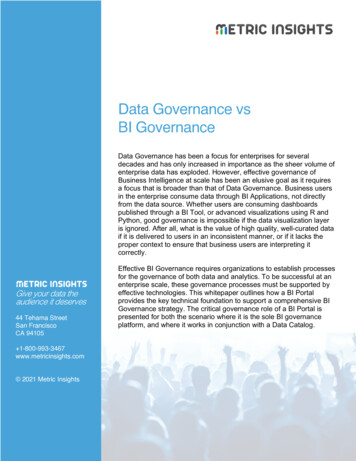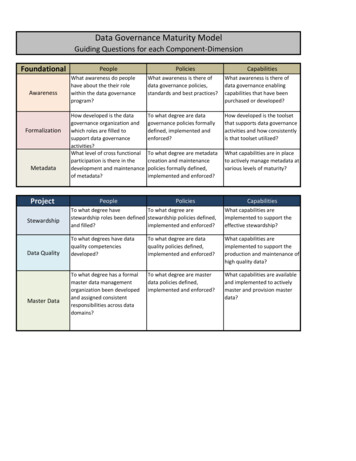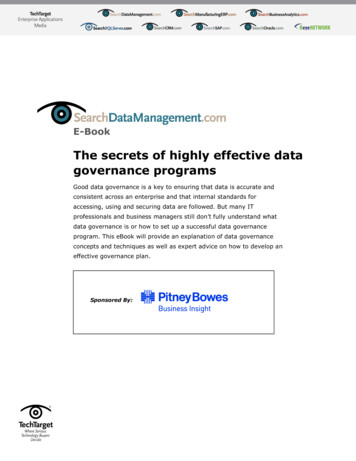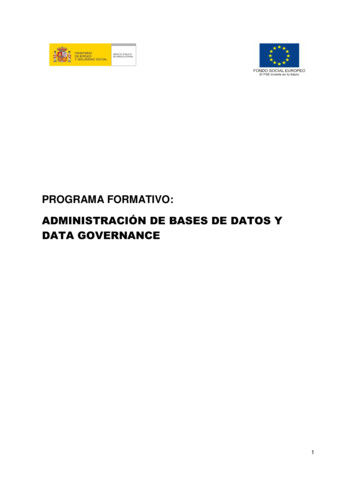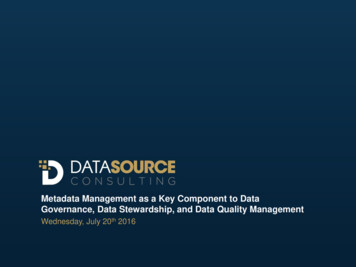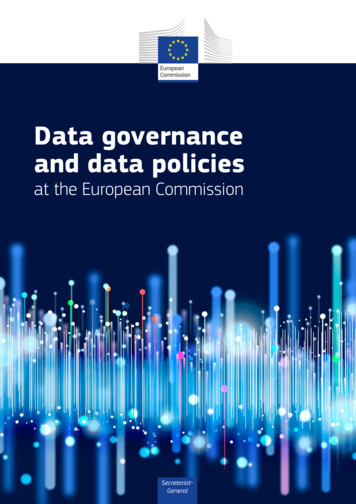
Transcription
Data governanceand data policiesat the European CommissionSecretariatGeneral
EUROPEAN COMMISSIONSecretariat-GeneralJuly 2020
ContentsExecutive summary41. Introduction6667891.1. Context and scope1.2. What are data governance and data policies?1.3. Why invest in data governance and data policies?1.4. How to implement data governance and data policies?1.5. Guiding principles2. DATA GOVERNANCE ROLES AND RESPONSIBILITIES2.1. Boards and groups2.1.1. Strategic level — Information Management Steering Board2.1.2. Managerial level — Data coordination groups2.1.3. Managerial level — Data governance boards2.2. Individual roles2.2.1. Managerial level — Local data correspondent2.2.2. Managerial level — Data owner2.2.3. Operational level — Data steward2.2.4. Operational level — Data user2.3. Data governance partners2.4. Support roles2.4.1. Secretariat-General corporate governance team3. DATA POLICIES3.1. Data management3.2. Data interoperability and standards3.3. Data quality3.4. Data protection and information security101111111212121313141515151616192020
Executive summaryThe Juncker Commission put great emphasis on improving policymaking and internal processes by making it easier to accessinternal and external data, and extract insights from these data with advanced digital technologies. The Commission's datastrategy constitutes a corporate commitment to transform the Commission into a data-driven organisation, enabled by adata ecosystem governed by corporate data governance and data policies. President von der Leyen’s ‘political guidelines’ (1)set out a vision of a Commission that leads by example and is fully digital, agile, flexible and transparent, and emphasise the‘need to share’ data, considering data protection, information security and intellectual property.To ensure that the Commission can build on the available data and information as effectively and efficiently as possible whendeveloping its policies, it must invest in data governance and data policies today. To implement the von der Leyen Commission's‘whole of government approach’, obstacles to internally sharing, combining and reusing data assets will need to be removed,where and when possible. The ‘need to share’ principle should become the norm for sharing data, information and knowledge inthe organisation.This is a ‘living’ document. Its purpose is: (i) to show how data governance and data policies can allow the Commission totransform into a data-driven organisation; (ii) to provide direction; and (iii) to identify areas for further work. It is the result ofjoint work between the Secretariat-General and the local data correspondents network. It is informed by and consolidatesexisting local initiatives under a common corporate framework, and is aligned with international standards and good practicesin the field.Trusted and reliable analytics and artificial intelligence — which are key ingredients for transparent, evidence based policymaking— require findable, accessible, interoperable, secure and high-quality data.Data governance and data policies help the Commission comply with regulatory and legal requirements, notably those linkedto data and document management, access to data and documents (including open data), data protection, intellectual property and information security, thereby reducing associated risks. They deliver medium to long-term efficiencies in resourcesspent on data management, due to the optimisation of data creation, collection, acquisition, access, use, processing, sharing,preservation and deletion, and to better data quality.Data governance sets out a framework with clear roles, and the responsibilities and interdependencies of those roles.Data policies introduce common principles, guidance and working practices in the areas of data management, data interoperability and standards, and data quality. Equally important are the areas of data protection, information security and intellectual property. However, these are not the focus of this document. Corporate data policies do not specify detailed processes.This allows Directorates-General (DGs)/services to organise themselves in the way that best suits their internal organisation,while ensuring coordination and alignment across the Commission, including its executive agencies.Executive: Corporate Management BoardSTRATEGICLocal Data CorrespondentsData Protection correspondentsLocal Security Officers/ LocalInformatics Security OfficersCommission CentralIP serviceLegal Service(supported by local data governanceteams – optional)MANAGERIAL4 Data coordination groups,e.g. the networks of document management officersor statistical correspondentsData governance boards (optional)Data ownersOPERATIONAL(1)Information Management Steering BoardSecretariat-Generalcorporate governanceteamData stewardsData usersA Union that strives for more: my agenda for Europe – political guidelines for the next Commission 2019-2024.SupportData governance partnersData Protection OfficerInformation Technology andCybersecurity Board
Implementing data governance and data policies will require action and investment at both corporate and local level. TheCommission is steadily improving the processes underpinning its data strategy. In 2019 it started with the definition andset-up of the framework. From 2020 onwards it will proceed with iterative development, progress monitoring and otherimprovements. At first, DGs/services will prioritise high-value data assets, such as master and reference data. Implementation will be iterative, in that sets of principles will be introduced and then reviewed at the end of each phase to analysethe impact on business processes and IT systems. Unless required by binding legislation, such as a regulation or a Commission decision, or specifically mentioned as ‘optional’, these policies are implemented on a ‘comply-or-explain’ basis.In line with the proportionality principle, the Commission’s DGs/services (2) are expected to implement these policies, andany diverging local approaches should be justified.Data maturity of the CommissionRoll-out & operationFully embed data governance anddata policies in all key businessprocesses and corporate/core ITsystems(Pilot) implementationMonitor, refine and improveDGs/services pilot data governance anddata policies in key business processesand corporate / core IT systemsDefinition & set-upSet up the baseline for datagovernance and data policiesIdentify gaps and develop data policiesat corporate and local levelSet up corporate support functionMonitor, refine and improveIdentify areas where corporatesupport and coordination areneeded20192020-20212022 onwardsThe following initiatives/bodies will help DGs/services implement data governance and data policies locally: The local data correspondents network, which is operational since May 2019. The members of the network shareknowledge, experience and practices for successful implementation. They will also receive training to prepare thembetter for their roles. A data advisory service by the Joint Research Centre and the Directorate-General for Informatics (DIGIT), with theparticipation of the Publications Office (OP) and Eurostat (ESTAT), will be launched in mid-2020. It will provide consultancy and support for data governance and data management projects.(2)This includes DGs, services and executive agencies.EXECUTIVE SUMMARY 5
1. INTRODUCTION1.1. Context and scopeThe 2016 Communication on data, information and knowledge management at the Commission (3) emphasised theneed to improve information retrieval and delivery and to maximise the use of data for better policy making. To thisend, the Commission’s data strategy set out a corporate commitment to transform the Commission into a data-drivenorganisation, enabled by a data ecosystem governed by corporate data governance and data policies. It helps theCommission implement its digital strategy for a digitally transformed, user-friendly and data-driven administration (4).It highlights the importance of putting data creation, collection, acquisition, access, use, processing, sharing and preservation at the centre of the Commission’s digitalisation process.In 2018, the Commission adopted a package of measures (5) to strengthen its corporate governance structure withthe Corporate Management Board and its supporting bodies, including the Information Management Steering Board(IMSB). The IMSB helps steer data governance and data policies, and recognises them as crucial for achieving theCommission’s vision of unlocking the power of data to improve policy making.Data governance and data policies aim to provide guidance, assurance and support that will transform the Commission into a data-driven organisation by: defining clear roles and responsibilities; and introducing common principles, guidance and working practices that provide the foundation for harmonised andcoordinated data management across the organisation.The scope of data governance and data policies includes data assets that are owned, used or reused by the Commission and its executive agencies regardless of their level of information confidentiality (6). This includes data used forpolicymaking, administrative data and personal data.For third-party data assets where the Commission is not the owner but the user, processor or controller, e.g. data collected from Member States due to a legal obligation or data licensed from third parties (7), the Commission remainsresponsible for their management for as long as it is using them both for their primary purpose and for secondarypurposes (i.e. reuse).The data governance and data policies laid out in this document are applicable to DGs, services and executive agencies. Decentralised agencies may also consider following them.1.2. What are data governance and data policies?Data governance entails defining, implementing and monitoring strategies, policies and shared decision-making overthe management and use of data assets. It is performed by Commission staff with established data-related roles.Data policies are a set of broad, high level principles (8) which form the guiding framework in which data assets in theCommission can be managed (9). More specifically, data policies govern data management, data interoperability andstandards, data quality, data protection and information security.(3)(4)(5)(6)(7)(8)(9)6 C(2016) 6626 gital-Strategy enGovernance in the Commission.Levels of information confidentiality as defined in C(2019) 1903 final.In the case of acquired data assets the Commission obtains IP ownership, e.g. via a service contract, whereas when data is licensed,the Commission obtains no IP ownership but only the rights of use.Where needed, data policies will be complemented by detailed guidelines and processes. Such guidelines and processes may bedeveloped either at corporate level, interservice level or local level. This remains outside the scope of this documentSee definition of ‘data policy’ in the European Interoperability Reference Architecture.
A data asset is any collection of data, any data set or any information that is somehow linked, e.g. by common codesor metadata, which has been created by the Commission, collected from Member States or other stakeholders, or acquired from third parties in the context of projects, policy or administrative processes. Data assets may be structuredor unstructured (10), static or dynamic, raw or curated. Data assets are in digital formats.1.3. Why invest in data governance and data policies?To ensure that the Commission can build on the available data and information as effectively and efficiently as possible when developing its policies, it must invest in data governance and data policies today. To implement the ‘wholeof government approach’ and the ‘need to share’ principle of the von der Leyen Commission, obstacles to internallysharing, combining and reusing the data assets will need to be removed.Corporate data governance and data policies will improve the traceability, accessibility, and preservation of dataacross the entire Commission, which will increase the transparency of the evidence that underpins policymaking.This will allow the Commission to deliver on its commitments under both the Interinstitutional Agreement on BetterLaw-Making and the better regulation policy, which will strengthen Interinstitutional cooperation and trust in the EUpolicy-making process.Data governance and data policies, accompanied by advanced analytical models, will help the Commission improveits evidence-based policymaking and enhance its internal processes. Trusted and reliable analytics and artificial intelligence require accessible, trusted, unbiased, interoperable, secure and high-quality data.Data governance and data policies help the Commission comply with relevant regulatory and legal requirements —notably those linked to data and document management, access to data and documents (including open data), dataprotection, intellectual property and information security — thereby reducing associated risks.Data governance and data policies will create medium to long-term efficiencies in data management resources, dueto the optimisation of data creation, collection, acquisition, access, use, processing, sharing, preservation and deletion,and to better data quality.(10) Structured data assets are organised according to a predefined data model or schema and the content of each field/variable can assume only predefined values. Unstructured or semi-structured data assets are not structured via predefined data models, schemataor code lists.INTRODUCTION 7
1.4. How to implement data governance and data policies?Implementing data governance and data policies will require action and investment at both corporate and local level. Itshould be coordinated with the implementation of domain specific data policies, e.g. for statistical or geospatial data,and the implementation of the Commission’s digital strategy to maximise synergies.The Commission is steadily improving the process underpinning its data strategy. In 2019 it started with the definition andset-up of the framework. From 2020 onwards it will proceed with iterative development, progress monitoring and otherimprovements (see figure below).Corporate actions will be organised to help DGs/services apply data governance and data policies.Data maturity of the CommissionRoll-out & operationFully embed data governance anddata policies in all key businessprocesses and corporate/core ITsystems(Pilot) implementationMonitor, refine and improveDGs/services pilot data governance anddata policies in key business processesand corporate / core IT systemsDefinition & set-upSet up the baseline for datagovernance and data policiesIdentify gaps and develop data policiesat corporate and local levelSet up corporate support functionMonitor, refine and improveIdentify areas where corporatesupport and coordination areneeded20192020-20212022 onwardsFigure 1: Data governance and data policies implementation at the Commission8
1.5. Guiding principlesData governance and data polices at the Commission will be: Embedded: the focus should be on their seamless integration into existing business processes and their simplification,whenever possible, which remains the responsibility of DGs/services. Data governance and data policies should notintroduce additional bureaucratic burden in existing business processes. Any costs introduced by data governance anddata policies will be neutralised in the medium term from the added value they provide. Sustainable: data governance and data policies should not be seen as a project with a pre-determined end date. They area continuous improvement process undertaken by the Commission and sponsored by the highest level of management. Measurable: being able to measure progress and plan ahead is crucial for continuous improvement. The progress andimpact of data governance and data policies on data quality, people, business processes and IT systems will be measured regularly to maintain the commitment of all stakeholders. Accountable and responsible: good governance makes clear to all stakeholders their own roles and responsibilities aswell as those of others; it communicates the relevant policies clearly and encourages behaviours and actions that areconsistent with these. A culture of collaboration and shared responsibility for data-related matters, from quality throughto protection and security, will be nurtured, going beyond compliance to rules and requirements. Transparency-oriented: To increase trust in its policymaking process, data governance and data policies, the Commission should seek to enable other EU institutions and agencies, Member States’ administrations and third parties toaccess and reuse Commission data assets, in particular those used for policymaking. Principle-based: Corporate data governance and data policies should focus on laying down principles and providingguidance, rather than on specifying detailed processes. This will allow DGs/services to organise themselves in the waythat best suits their internal organisation, while ensuring a common level of coordination and harmonisation across theCommission. These principles will therefore be reflected in the processes to be specified and implemented by the DGs/services for managing their data assets. These principles may be reviewed or extended as the implementation of datagovernance and data policies in the Commission progresses. Commission-wide and comprehensive: Data governance and data policies may be implemented locally but need tobe coordinated across the organisation to be effective. They govern primarily the way people interact with data assets,and are implemented through changes in business processes, IT systems and staff. At the same time, the full lifecycleof data assets should be managed. Data-related risks, especially those linked to data protection, intellectual property,and information security will also be managed. Proportionate: Some DGs/services are more ‘data intensive’ than others. Activities and investments to implement datagovernance and data policies will be proportionate to the size of each DG/service, their data management needs (including type of data managed and information confidentiality level) and capabilities, and the relative importance of datamanagement for their operations. Less ‘data intensive’ DGs/services are encouraged to collaborate with others, e.g. aspart of families, to benefit from synergies. 'Comply-or-explain’: Unless required by a binding instrument, such as a regulation or a Commission decision, or specifically mentioned as ‘optional’, data policies are implemented on a ‘comply-or-explain’ basis. DGs/services are expectedto implement the principles and requirements introduced by the data policies. Otherwise, they will need to provide aformal justification to the right level of governance.INTRODUCTION 9
2. DATA GOVERNANCE ROLES ANDRESPONSIBILITIESThis section specifies the corporate roles (i.e. those of boards and groups) and the individual roles of those involved in datagovernance and their responsibilities (10). There are three levels of data governance (11): Strategic, which defines the long-term vision, gives direction, oversees progress, takes strategic decisions, and acts asthe highest point of reference for issues and matters related to data governance and data policies. Managerial, which is accountable and responsible for developing and implementing data policies at corporate level andlocal level. It monitors progress, reports to the strategic level and refers to them any issues and matters that are beyondits decision-making power or mandate. Operational, where data policies are actually implemented and most decisions about data are taken. Whenever necessary, issues are escalated to the managerial level for resolution.Figure 2 provides a general overview, but is not an exhaustive mapping of all data governance or Commission-level management committees, groups and networks. Additional layers may be possible, depending on the domain’s complexity andthe organisational set-up of a DG/service.All knowledge and practices relating to data management and data quality will be actively shared within and across groupsat all three levels (strategic, managerial or operational) by means of corporate collaboration solutions and practices.Executive: Corporate Management BoardSTRATEGICInformation Management Steering BoardSecretariat-Generalcorporate governanceteamLocal Data CorrespondentsData Protection correspondentsLocal Security Officers/ LocalInformatics Security OfficersCommission CentralIP serviceLegal Service(supported by local data governanceteams – optional)MANAGERIALData coordination groups,e.g. the networks of document management officersor statistical correspondentsSupportData governance partnersData Protection OfficerInformation Technology andCybersecurity BoardData governance boards (optional)Data ownersOPERATIONALData stewardsData usersFigure 2: Commission data governance levels and roles(10) Principles listed in these document are aligned with the principles put forward by the European Commission Digital Strategy.(11) Inspired from R. S. Seiner, ‘Non-Invasive Data Governance : The Path of Least Resistance and Greatest Success’, first edition. Technics Publications: 2014.10
2.1. Boards and groups2.1.1. Strategic level - Information Management Steering BoardThe Information Management Steering Board (IMSB) is a permanent subgroup of the Corporate Management Board. It supports the Corporate Management Board in overseeing the implementation of the Commission’s strategy on data, informationand knowledge management. The IMSB is supported in its role by the Information Management Team. With regard to datagovernance and data policies, the IMSB: steers and approves the corporate data strategy, data governance and data policies; provides an opinion on local data policies, while leaving room for DGs/services to develop and implement their ownapproaches tailored to their specific needs; prioritises corporate actions and seeks to enhance collaboration and synergies in the implementation of the strategy; makes strategic decisions that cannot be made at the managerial and operational levels; monitors the implementation of data policies, and ensures cooperation with the data governance partners, where necessary; actively communicates and promotes the value of proper data governance and management throughout the organisation, giving visibility to related projects and outcomes; calls on the managerial level, DGs/services that are not members of the IMSB, data governance partners and existinginterservice groups to provide contributions to and/or to implement data policies and actions; provides advice on data policies to the Information Technology and Cybersecurity Board; and considers the human and financial resources necessary for developing, implementing and running data governance anddata policies.2.1.2. Managerial level — Data coordination groupsTo enhance (interservice or interinstitutional) coordination on data matters and to facilitate the implementation of data policies in the Commission a number of committees, networks and communities have been established. These are representedin corporate data governance as data coordination groups.A data coordination group is a formal or informal network, body, committee or community of practice that deals with data-related matters.Each data coordination group has a clear mandate. The mandate is approved by the DGs/services requesting its formation.Some data coordination groups may be permanent while others may be active for a specific period of time. The IMSB willhave the overview of existing groups and should be consulted on the establishment of new groups.In general, a data coordination group may be organised around: a data (or reference data or metadata) policy domain (for which it may be assigned as domain owner), such as theStatistical Correspondents, the Commission interservice group on geographic information (COGI), the HR family datacoordinators, and the interservice working group for calls and code management; a specific data or information policy, such as the document management officers (DMO), the data protection correspondents, the local security officers, the local intellectual property rights (IPR) and reuse officers or the knowledgemanagement network; an activity linked to data or metadata standardisation, such as the interinstitutional metadata management committee(IMMC) and the interinstitutional metadata formats committee (IMFC); a data competency, for example in the form a data lab or community of practice, where people who share a commoninterest, competency or skill come together to share knowledge and expertise, and co-create solutions which can beused also by others in the Commission;DATA GOVERNANCE ROLES AND RESPONSIBILITIES 11
Data coordination groups: develop, implement, monitor and raise awareness on data policies in their data (management) domain and/or policyarea, in alignment with corporate data governance and data policies; develop, implement and promote the use of data common metadata, standardised controlled vocabularies and datastandards for their data domain or data asset; provide guidance, report and escalate to the strategic level, as needed; connect the business and policy needs with the data assets, identify and address data gaps and needs at corporate,interservice or local level; collaborate with other groups and data governance partners to contribute to or implement specific data policies andactions; and provide support and share knowledge with data owners, data stewards and other Commission staff working in their datadomain and/or policy area, or competency.2.1.3. Managerial level - Data governance boardsData governance boards coordinate data-related matters within a (family of) DG(s)/service(s). The establishment of datagovernance boards is optional (12). Their responsibilities can be carried out by other existing roles or entities in a DG/service.A data governance board should be chaired by a (senior) manager and may comprise representatives from directorates orunits dealing with policy, data, IT, security, legal matters and procurement. This includes the Local Data Correspondent, theLocal Security Officer, the Local Informatics Security Officer, the Data Protection Coordinator, the Document ManagementOfficer, the Statistical Correspondent and the Information Resource Manager.Data governance boards: support the proper implementation of corporate data governance and policies in their DGs/services; ensure that their DGs/services develop and implement local data policies, building upon existing corporate guidance; monitor the maturity of their DG/service, in terms of governance, management and use; promote data governance, management, use (including but not limited to reporting, analytics and artificial intelligenceapplications) and literacy at all levels within their DG/service; and advise on human and financial resources required to support the development, implementation and operation of datagovernance and data policies.2.2. Individual roles2.2.1. Managerial level — Local data correspondentLocal data correspondents (LDCs) serve as the single point of contact for data management in their DG/service. LDCs havebeen designated in all DGs/services. Their role can be delegated to or fulfilled by more than one person, depending on thesize and needs of a DG/service. Local data governance teams may be set up by DGs/services to implement data governanceand data policies, supporting the LDCs. They: contribute to the proper implementation of corporate data governance and data policies in their DGs/services; coordinate the development and local implementation of data policies, and align local data policies (if any) with thecorporate ones; represent their DG/service in the LDCs network coordinated by the Secretariat-General; coordinate the update of their DG’s/service’s data assets (covering internal data, open data and licenced/purchased(12) Some DGs/services have already set up such boards.12
data) in the Commission’s data catalogue, following well-defined and, where possible, automated processes;remain informed, promote and, if relevant, participate in data standardisation activities related to the data assets oftheir DG/service;liaise with the strategic, managerial and operational levels, and coordinate with data governance partners;raise awareness of corporate and local data governance and data policies in data coordination groups, data stewards,data owners, data analysts, and data governance partners in their DG/service;raise awareness of the added value of proper data management in the management and staff of their DG/service;monitor and report progress to their senior management; andcontribute to the (bi-)annual work programmes of the IMSB and action plans per area, as needed.2.2.2. Managerial level — Data ownerData owners are managers or staff who have been assigned by the strategic level as being responsible and accountablefor a data domain or data asset. By data owners we refer to the business owners of data assets and not to the owners orproviders of IT systems used for creating, collecting, storing, processing, disseminating or archiving data. Every data assetmust have a designated data owner. Likewise, the owner(s) of a data domain may be designated (13).Data owners can be supported by one or more data stewards. Data owners may coordinate with each other to share knowledge and resolve common problems. Data owners: are accountable for the quality of their data asset(s); are accountable, together with the owners of IT systems that store the data assets, for the proper implementation ofcorporate and local data policies for their data domain or data asset, notably access to
(IMSB). The IMSB helps steer data governance and data policies, and recognises them as crucial for achieving the Commission's vision of unlocking the power of data to improve policy making. Data governance and data policies aim to provide guidance, assurance and support that will transform the Commis-sion into a data-driven organisation by:
